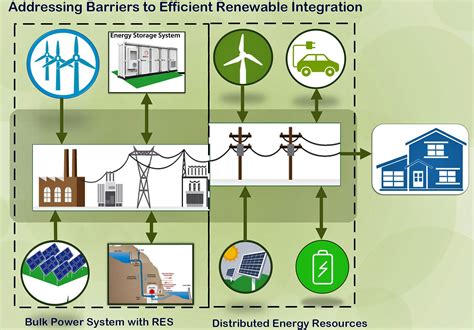Explore the significance of renewable energy policies, global challenges, government roles, economic impacts, and future prospects for mandatory adoption worldwide.In an era marked by growing environmental concerns and the urgent need for sustainable solutions, the question arises: why hasn’t renewable energy been made mandatory? While the importance of renewable energy policies is clear, several key barriers have hindered the implementation of unified regulations across the globe. This article delves into the dynamics of renewable energy legislation, exploring the role of governments and the economic implications of making renewable energy mandatory. By examining successful case studies and considering future prospects, we aim to illuminate the path forward and encourage a deeper understanding of the critical steps needed to embrace a renewable energy future. Join us as we unravel the complexities surrounding renewable energy mandates and their potential impact on our planet and economy.
Understanding The Importance Of Renewable Energy Policies
Establishing robust renewable energy policies is crucial for several reasons. Firstly, these policies provide a systematic framework that encourages the transition from conventional fossil fuels to cleaner, renewable sources of energy. This shift is essential to combat climate change and reduce greenhouse gas emissions, critical goals in today’s environmental discourse.
Moreover, effective renewable energy policies enhance energy security. By diversifying the energy mix and reducing dependence on imported fossil fuels, countries can better protect themselves against market volatility and geopolitical tensions. Policies aimed at promoting local renewable energy sources not only create a stable energy supply but also stimulate domestic job creation in emerging sectors.
In addition, policies can play a pivotal role in driving innovation and technological advancement in the renewable energy sector. By setting clear targets and providing incentives, governments can promote research and development efforts that lead to more efficient technologies, ultimately reducing costs and enhancing accessibility.
Renewable energy policies can foster broader environmental and economic benefits. They promote sustainable development, ensuring that future generations have access to vital resources. In summary, without robust renewable energy policies in place, the transition toward a sustainable and resilient energy future remains uncertain. It highlights the question of why hasn’t a more universally mandatory approach to renewable energy regulations been adopted. As policymakers consider these factors, it becomes increasingly clear that such frameworks are not merely beneficial but essential for a sustainable future.
Key Barriers To Implementing Mandatory Renewable Energy Regulations
Despite the overwhelming evidence of the benefits of renewable energy, several key barriers prevent the implementation of mandatory regulations that would require its adoption. Understanding these barriers is crucial in addressing the question of Why hasn’t renewable energy been made mandatory?
| Barrier | Description |
|---|---|
| Political Will | A lack of commitment or prioritization from governments can hinder the development of comprehensive renewable energy policies. |
| Infrastructure Challenges | Existing energy infrastructure is often designed for fossil fuels, making the transition to renewable energy more complicated and costly. |
| Economic Concerns | Initial investment costs for renewable energy technologies can be high, leading to concerns about financial viability and economic implications. |
| Public Perception | Misunderstandings and skepticism about renewable energy can limit public support, which is essential for pushing regulatory changes. |
| Lobbying by Fossil Fuel Industries | Powerful fossil fuel interests often lobby against renewable energy mandates, reinforcing existing energy paradigms. |
Overcoming these barriers requires coordinated efforts from governments, industries, and communities to create an environment where renewable energy legislation can thrive. As we delve deeper into the complexities of this topic, it becomes clear that addressing these challenges is essential for the advancement of global renewable energy initiatives.
Why Hasn’t The Global Community Embraced Renewable Energy Legislation?
Despite the pressing need for sustainable energy solutions, the question Why hasn’t the global community embraced renewable energy legislation remains pertinent. Several factors contribute to this hesitance, which can be broken down into political, economic, and societal dimensions.
Political uncertainty in many regions often leads to inconsistent energy policies. Different governments may prioritize short-term economic gains over long-term environmental benefits, which can create an atmosphere of reluctance towards implementing comprehensive renewable energy laws.
Moreover, the economic implications of shifting toward renewable energy can be daunting. Industries reliant on traditional fossil fuels often resist change due to concerns about job losses and financial instability. Additionally, the initial investment required for renewable energy infrastructure can deter governments from setting mandates without assured returns.
From a societal perspective, there is often a lack of public awareness and engagement regarding renewable energy. Citizens may not fully understand the benefits, leading to limited pressure on policymakers to act. Misinformation and competing interests can further cloud public perception, making it a challenge to create a unified demand for legislation.
Furthermore, varying levels of development across countries complicate the situation. Emerging economies may struggle to invest in renewable resources, as their focus may be on meeting immediate energy demands with available resources, often fossil fuels. This disparity underscores the need for international collaboration and support initiatives to help these nations transition smoothly.
The question Why hasn’t the global community embraced renewable energy legislation can be addressed through multiple lenses, encompassing political, economic, and social barriers that need to be navigated to pave the way for a greener future.
The Role Of Governments In Promoting Renewable Energy Adoption
Government action is critical in driving the transition to renewable energy sources. By establishing supportive policies and frameworks, governments can significantly influence the pace of adoption. Here are several ways in which governmental intervention can facilitate renewable energy adoption:
1. Financial Incentives: Governments can provide subsidies, tax credits, and grants for renewable energy projects, making them more financially viable. These incentives help lower the initial investment costs for businesses and individuals.
2. Regulatory Support: Creating clear regulations that encourage renewable energy development provides a stable environment for investment. This includes setting legally binding renewable energy targets, which can motivate energy producers to invest in renewable technologies.
3. Research and Development Funding: Investing in research and development can spur innovation in renewable energy technologies. Governments can support initiatives that explore new advancements, making renewable energy more efficient and accessible.
4. Infrastructure Development: The government can play a pivotal role in developing the necessary infrastructure, such as grids and energy storage systems, to support renewable sources. This ensures that generated energy can be effectively harnessed and distributed.
5. Public Awareness Campaigns: Governments can launch education and awareness programs to inform citizens about the benefits of renewable energy. Greater public understanding fosters community support and can lead to increased demand for renewable technologies.
6. International Collaboration: By engaging in international agreements and partnerships, governments can share best practices and resources, driving worldwide commitment to renewable energy. Such collaborations can also tap into global funding and technology exchange.
Overall, the question of why hasn’t renewable energy been made mandatory can often be traced back to the varying levels of commitment and action taken by governments worldwide. Their involvement is crucial for creating a conducive environment that not only promotes but accelerates the transition towards sustainable energy solutions.
Exploring The Economic Impact Of Mandatory Renewable Energy Laws
The implementation of mandatory renewable energy laws can have significant economic impacts, both positive and negative. Understanding these effects is crucial for policymakers and stakeholders striving to enhance the sustainability of energy systems while also considering economic growth.
One of the most notable advantages of mandatory renewable energy laws is the promotion of job creation. Transitioning to renewable energy sources typically requires skilled labor for installation, maintenance, and management. This shift can generate thousands of jobs in sectors such as solar, wind, and bioenergy, contributing to local and national economies.
In addition, these laws often encourage technological innovation, as companies are motivated to develop more efficient and cost-effective renewable technologies. This innovation can lead to improved energy efficiency and reduced costs over time, making renewable energy more accessible to a broader audience.
Moreover, mandatory policies can help stabilize energy prices. By diversifying the energy supply through renewables, countries can reduce their dependence on imported fossil fuels, which are subject to volatile prices in the global market. This stability can foster a more predictable economic environment for businesses and consumers alike.
However, there are also challenges associated with these laws. Compliance costs can be significant for businesses required to meet renewable energy targets, potentially leading to increased energy costs for consumers. Small and medium-sized enterprises may particularly struggle to absorb these costs, which could hinder their competitiveness.
Furthermore, the shift towards renewable energy often requires substantial initial investments in infrastructure. Governments may need to allocate significant resources to build the necessary facilities and upgrade existing systems to accommodate renewables. While these investments can yield long-term benefits, they present a short-term financial strain.
Therefore, while the economic impact of mandatory renewable energy laws can be largely positive, it is essential to balance these benefits with potential challenges. Policymakers must approach the implementation of such laws with careful planning and consideration to maximize economic benefits while minimizing drawbacks. The question remains: Why hasn’t there been a more widespread adoption of these critical policies?
Case Studies: Countries Successfully Implementing Renewable Energy Mandates
Examining global initiatives provides valuable insights into how mandatory renewable energy regulations can be effectively implemented. Several countries have adopted ambitious policies that not only promote renewable sources but have also shown tangible results in reducing reliance on fossil fuels and decreasing carbon emissions.
Germany is often cited as a leading example of a nation that has successfully transitioned toward renewable energy. The country’s Feed-in Tariff policy, introduced in 2000, incentivizes the production of renewable energy by guaranteeing fixed payments for these energy sources. As a result, Germany has seen a significant increase in solar and wind energy, positioning itself as a global leader in renewable technologies.
Denmark, another benchmark for renewable energy policy, has committed to sourcing 50% of its total energy consumption from wind power by 2030. The Danish government established a system of incentives that prioritizes renewable energy, thus fostering innovation and investment in this sector. Their proactive approach has created one of the largest wind energy markets globally and has reduced dependence on fossil fuels.
China has also made strides in renewable energy with its strict regulations and incentives for solar and wind power development. The nation leads the world in investments in renewable technology, pushing for a greener economy while addressing air pollution issues. China’s national policies set ambitious goals for renewable energy consumption, demonstrating the power of regulation in shaping energy markets.
These case studies illustrate that when governments implement well-structured frameworks and regulations, the adoption of renewable energy can flourish. However, these successes prompt the question: Why hasn’t this momentum been replicated universally? The combination of political will, public support, and economic incentives are undeniably critical in driving similar initiatives in other nations.
Future Prospects: Will Renewable Energy Become Mandatory Worldwide?
The shift towards renewable energy has been gaining momentum over the past decade, spurred by rising concerns about climate change and the depletion of traditional energy resources. As we look to the future, the question arises: will renewable energy become mandatory worldwide? To understand this potential shift, we must explore various factors influencing the adoption of mandatory regulations.
Firstly, increasing public awareness of environmental issues has led to higher demand for sustainable practices and policies. Citizens are advocating for legislation that prioritizes clean energy, which puts pressure on governments to act. This public support is crucial, as it can drive political will and encourage legislative bodies to consider mandatory requirements for renewable energy.
Secondly, numerous nations are recognizing the economic benefits that renewable energy can bring. As technology advances, the cost of producing renewable energy is continuously decreasing, making it more accessible. If these trends continue, governments may find it economically advantageous to implement mandatory renewable energy laws, aligning with both environmental and economic goals.
Additionally, international agreements and global targets, such as the Paris Agreement, are pushing countries towards cleaner energy sources. As nations strive to meet their commitments, we may see a movement towards binding renewable energy regulations that would make renewables a mandatory part of their energy mix.
However, challenges remain. The resistance from entrenched interests in fossil fuels, concerns about energy security, and the economic implications for industries reliant on non-renewable energy sources all play significant roles in slowing the transition. Much depends on how these barriers are addressed in the coming years.
While the future of mandatory renewable energy regulations is uncertain, the combination of public pressure, economic incentives, and international commitments significantly tilts the balance in favor of a transition towards renewable energy becoming more commonplace, if not mandatory. The ongoing dialogue around the question: Why hasn’t renewable energy been made mandatory will continue to shape policies and influence actions in the global arena.
Frequently Asked Questions
The main reasons include economic factors, political influences, infrastructure limitations, public resistance, and concerns over reliability and consistency of renewable sources compared to fossil fuels.Governments can create policies, offer incentives, and set regulations that promote renewable energy but often face political and economic challenges that delay or prevent mandatory policies.Public opinion can significantly influence policymakers, especially if there is resistance to change, misinformation about renewable energy, or concerns over higher costs and reliability.Yes, some countries like Germany and Denmark have implemented ambitious policies and regulations to increase the share of renewable energy, although they may not be fully mandatory for all energy sectors yet.Making renewable energy mandatory could lead to reduced greenhouse gas emissions, less reliance on fossil fuels, job creation in the green sector, and improved energy security.Policymakers face challenges such as economic implications for industries reliant on fossil fuels, balancing energy prices for consumers, and ensuring infrastructure can support an increased renewable energy supply.Advancements in technology can reduce costs and improve efficiency and reliability of renewable energy sources, making the idea of mandates more feasible and appealing to both policymakers and the public.












